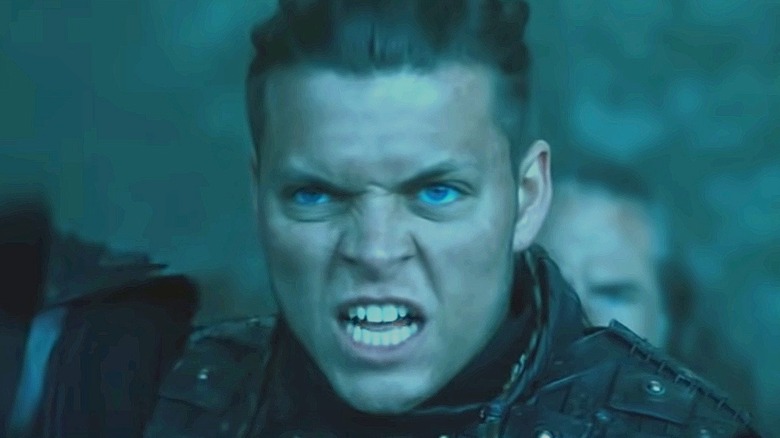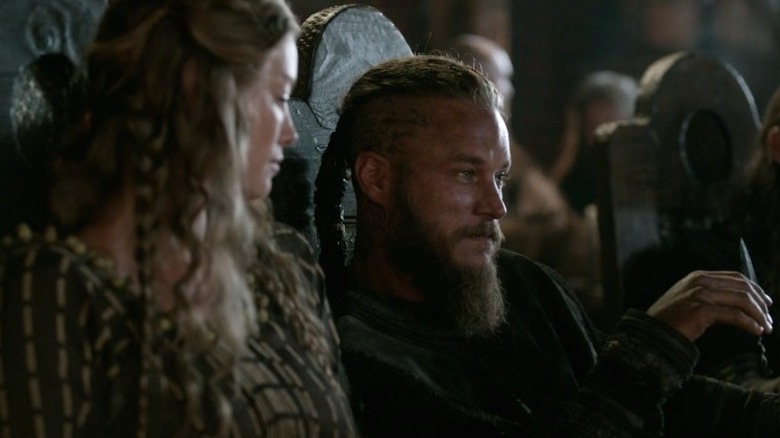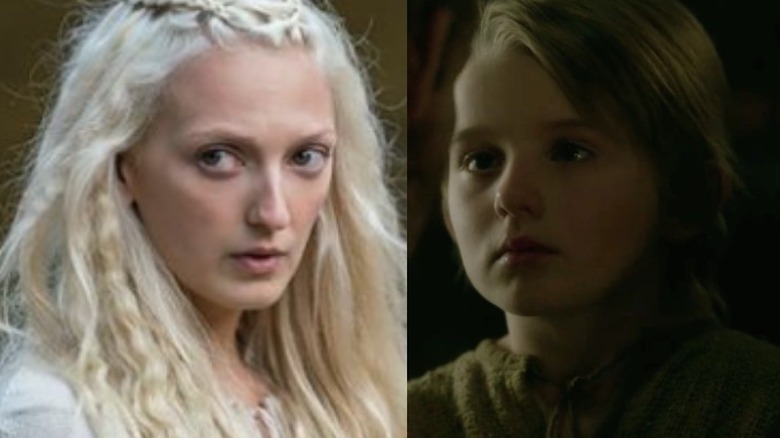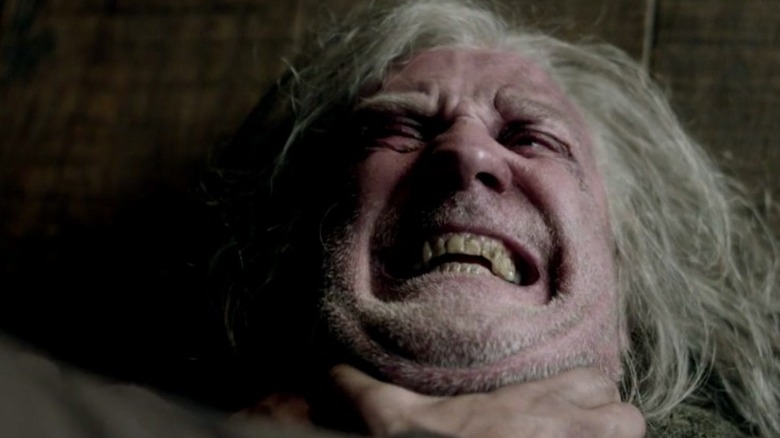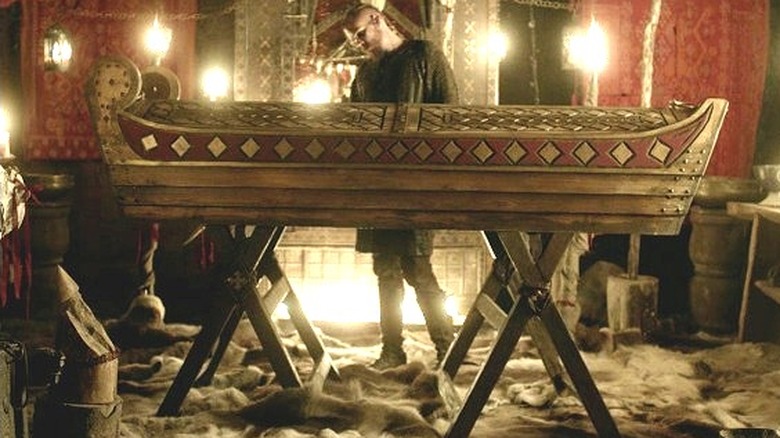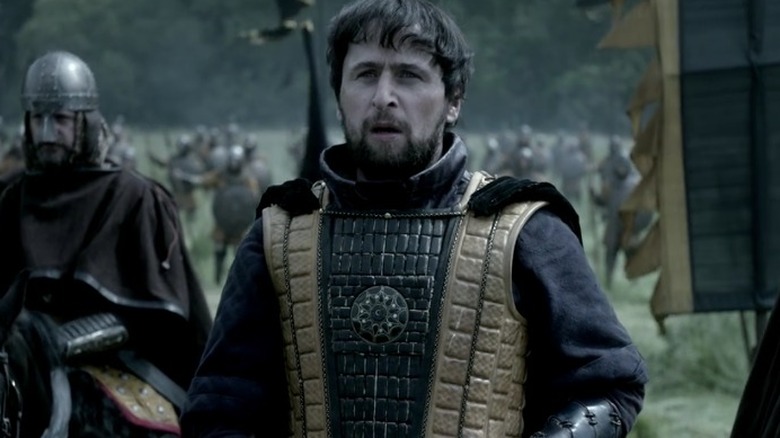Plot Holes In Vikings Everyone Ignores
In 2013, the History Channel struck gold when it debuted Season 1 of Michael Hirst's "Vikings." Although Marvel had released its first installment in the "Thor" franchise in 2011, you could easily argue that the full-on renaissance that Norse mythology and history are currently enjoying (via The Independent) owes a greater debt to Hirst's Icelandic Saga-centric series. Throughout six seasons, "Vikings" blended myth and legend with history (occasionally condensing or altering the latter to enhance the former) and introduced audiences all over the world to talented actors like Katheryn Winnick (Lagertha), Alex Høgh Andersen (Ivar), Gustaf Skarsgård (Floki), and of course, Travis Fimmel (Ragnar).
It's no easy feat to open a series focusing on one character and re-focus the narrative on that character's offspring in a show's last two seasons. Still, the Emmy award-winning "Vikings" managed to do precisely that. Of course, if one watches any multiple-season series closely and enough times, the narrative will undoubtedly spring a few leaks. This is particularly true of a series that tackles the blending of historical fact with historical fantasy, and while "Vikings" managed to dodge the major plot holes and mishaps that can plague such an undertaking, it wasn't without its share of "you missed a spot" moments.
About those extremely necessary grain stores...
The plot hole: In Season 2, Episode 4, Ragnar returns from Wessex and reunites with his estranged wife and son to take back the village of Kattegat from Jarl Borg (Thorbjørn Harr), who usurped the earldom in response to King Horik (Donal Logue) and Ragnar breaking their alliance with him. To defeat Jarl Borg with their limited forces, Ragnar and co. resolve to burn the grain stores at Kattegat to force their enemy out from behind its walls. There's just one problem: As they approach winter, the citizens of Kattegat will need those grain stores to, you know, eat.
This self-destructive approach is acknowledged in a later episode, wherein Ragnar apologizes to the visiting Horik for the "poverty of the feast" and says it's been a hard winter. Yet, the feast looks pretty plentiful, and the population of Kattegat doesn't appear to have decreased in size. Since the harsh Scandinavian winters are partially what compels Ragnar to seek lands elsewhere, it seems unfathomable that there wouldn't have been mass famine in the absence of available grain.
Why everyone ignores it: Some logistical issues serve to move a narrative forward — and some do not. Had "Vikings" spent more than a single line addressing the fact that the citizens of Kattegat suffered a food shortage over the long, devastating winter, we'd have sat through several boring episodes of random extras dying off from disease and famine. To what end? Ragnar's next action (the part that does move the narrative forward) would have remained the same. If a series spends too much time addressing pesky logistics, such as where a given village is getting their food from, it begins to feel less like an epic saga and more like a writers' room discussion playing itself out on screen. Who knows? Maybe they asked for help from another village. It's not as if Ragnar didn't have the necessary clout.
None of the women in Vikings ever age... ever
The plot hole: With little exception — some voices are lowered, some hair is lightened — the main female characters of "Vikings" seem to be frozen in time. Years pass, Ragnar's sons grow into adults, and yet, Queen Aslaug (Alyssa Sutherland), Earl Ingstad/Lagertha, Helga (Maude Hirst), and Queen Judith (Jennie Jacques) remain unaffected. This phenomenon is most vividly demonstrated in the character of Torvi (Georgia Hirst), who's a young woman at the time of Ubbe's (Jordan Patrick Smith's) birth. Yet, when the two eventually marry, they appear to be the same age.
Fans took issue with this and the fact that the pairs' former "babysitter/charge" relationship was never acknowledged. Torvi has survived countless injuries, birthed four children, witnessed the majority of those children die, and lived through several Scandinavian winters, all in an era where living to the age of thirty was a real magic trick. Somehow, she shows no signs of aging.
Why everyone ignores it: There's a combination of forces at work here. On the one hand, the struggle any series faces when choosing to span several decades is that it's not (obviously) filmed over several decades. Short of piling on prosthetics or recasting every actor, the show's creators have no good way of illustrating that a character has aged unless they grow from a small child into an adult (and are therefore recast). Part of the audience's willful suspension of disbelief includes accepting that a given character's appearance will remain relatively static (see: Alexander Dreymon in "The Last Kingdom").
Regarding Torvi, although she was "old enough" to be married when Ubbe was born, she could very well have been just 13 or 14-years-old. That said, there's still the issue of the men, who are shown aging. This has more to do with the fact that society still calls any woman over 29 a "cougar," while (actually) older men are showered with adjectives like "distinguished" or deemed "silver foxes."
Ragnar kills the messenger from Wessex, but not Floki
The plot hole: In Season 3, Episode 6, a long-suffering survivor (Søren Pilmark) of Ragnar's settlement in Wessex finds his way back to Kattegat. After revealing to Ragnar that nearly the entire colony was wiped out by Ecbert's son Aethewulf (Moe Dunford), Ragnar strangles him, presumably to keep him from spreading the word to others and making Ragnar look bad for trusting the Saxons. Of course, Floki also knows of the betrayal, as he's the one who first heard the lone survivor's story. As one fan pointed out on the series' subreddit, "If (Ragnar) really wants this under wraps Floki will have to die too."
Why everyone ignores it: As the series progresses, Ragnar's character becomes more and more unpredictable and seemingly self-serving. As viewers, the insight we once had into Ragnar's motivations wanes dramatically. Having him murder an innocent to hide a secret that could turn his people against him is an excellent way of demonstrating this. Having him kill off a central (and inarguably compelling) character with whom he has a long history of friendship would be taking this demonstration a bit too far.
Moreover, while it might seem illogical for Ragnar to trust that Floki will keep his secret (considering his god-fearing friend's repeated questioning of Ragnar's authority), it acts as yet another illustration of Ragnar's unmovable confidence in the way he holds over others. Ragnar doesn't kill Floki because he can't fathom a world wherein Floki would betray him — and in Ragnar's defense, he doesn't.
That time The Dead conquered Paris
The plot hole: After being paid to leave Paris (despite failing to breach its walls), Ragnar tells the French ambassadors that he is dying and asks to be baptized. Since he is suffering from a severe battle wound and indeed is on the verge of death, his forces (and the audience) believe he has renounced his gods to reunite with his deceased friend Athelstan (George Blagden). He requests a Christian burial and fakes his death, and the French permit his coffin to be brought inside the city to receive mass.
Once inside, Ragnar leaps out and sets to work opening the gates, allowing his forces to overtake and raid the city. There's just one problem: With the exception of his son Bjorn (Alexander Ludwig), absolutely nobody — the audience included — knew Ragnar was alive and that he had this plan in place. Still, the warriors that follow his "dead" body to the edge of Paris are fully prepared to do battle and storm the city when he opens the gates.
Why everyone ignores it: Recovering from the shock and betrayal of not being let in on Ragnar's plan (not even a little, since he has visions of Athelstan that prompt his sudden conversion, and that certainly appear genuine since no one is there save the viewer and Ragnar) is enough for fans to grapple with. Attempting to dissect flaws in his plan — e.g., why so many die-hard pagans chose to accept his conversion and follow him to the gates, why they were armed and in formation when he opened the gates, and why he allowed those closest to believe him dead — necessarily takes a backseat to recover from the emotional "loss" of the main character. Moreover, the faked death was an allusion to historical events (via Ancient Origins), so the handful of viewers aware of that obscure bit of history could technically count themselves in the know. Finally, it's possible Ragnar only told Bjorn as a means of testing the potential future ruler of Kattegat.
Even Mercian soldiers wouldn't have been this stupid
The plot hole: When Ragnar and his forces agree to fight Princess Kwenthrith's (Amy Bailey's) evil uncle and her bumbling younger brother Burgred (Aaron Monaghan) to secure her throne in Mercia, they easily defeat the former while the latter looks on helplessly. That's because, for some bonkers reason, said uncle and brother set their unevenly sized armies up on opposite sides of the river. Burgred has the larger army, so Ragnar makes the apparent decision to attack the smaller one on the opposite bank. Burgred has no means of getting his troops across the river, so how in the world they thought they'd be "teaming up" against the Viking mercenaries — whom they force to sail up the river toward them — is anyone's guess.
The Saxons knew full well that the Vikings were skilled strategists and understood things like basic arithmetic. Although Burgred has all the tactical sense and foresight of a golden retriever (possibly less), his uncle knows precisely what he's doing on the battlefield. Moreover, the prince would have been counseled by skilled generals and warriors. To split their army up so that half of it could easily be taken-out while the other half looked on would be a massive whoopsy daisy indeed, even for the pious Saxons.
Why everyone ignores it: Because watching Ragnar and his troops thoroughly crush Kwenthrith's pedophile uncle (Ian Beattie) while her dumbfounded little brother looks on in horror is just good fun. Besides which, unlike more historically-rooted series (again, see: "The Last Kingdom"), "Vikings" does not attempt to posit itself as historical fiction so much as fiction/fantasy based on history and the Icelandic Sagas, which were only partially historical. In their stories and poems, the 9th-century skálds would very likely have made the Saxons look every bit as stupid as they do in this particular battle.
